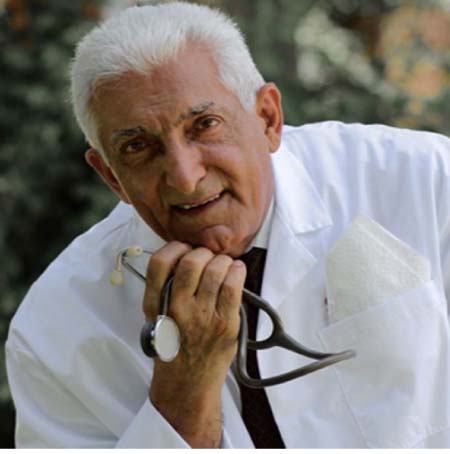
A stomach ulcer is a sore that develops in the lining of the stomach or the first part of the small intestine (duodenum) when the lining is eroded by stomach acid. Pain is the most likely symptom, but not everyone with a peptic ulcer experiences pain. Most ulcers heal and recur, so symptoms tend to come and go
Causes
Peptic ulcers are usually caused by an infection with Helicobacter pylori bacteria or by medications that weaken the stomach or duodenal lining. These medications include non-steroidal anti-inflammatory drugs such as ibuprofen or aspirin, and contortionists.
Symptoms
A stomach ulcer usually feels like burning, gnawing or aching pain anywhere from the navel to the breastbone. This pain can last a few minutes to several hours, and typically is worse when the stomach is empty.
Time Frame
The person may experience pain over a few weeks, once or several times a day. At this point the pain may gradually disappear, then develop again within a year or two
Warning
Bleeding ulcers can have signs of tarry black stools or vomiting blood. A perforated ulcer, or an ulcer that penetrates further than the upper layer of the lining, causes sudden intense pain throughout the abdomen. This condition is a medical emergency.
Treatment
Treatment for most ulcers includes medicines to reduce stomach acid, such as proton pump inhibitors. If the ulcer is caused by H. pylori bacteria, antibiotics are also prescribed. Bismuth medications can help relieve symptoms and also kill some of the bacteria.
It is estimated that about 1 in 10 people in The Gambia will have a stomach ulcer during some point in their life
Stomach ulcers can affect people of any age, including children, but mostly in adults.
Stomach ulcers, also known as gastric ulcers, are open sores that develop on the lining of the stomach. Similar ulcers can occur in bit of intestine just beyond the stomach, known as duodenal ulcers. Both stomach and duodenal ulcers are sometimes referred to as peptic ulcers. Here the term “stomach ulcer” will be used, although the following information applies equally to duodenal ulcers.
A stomach ulcer is a defect in the lining of the stomach or the first part of the small intestine. Normally, the lining of the stomach and small intestines is protected against the irritating acids produced in your stomach. If this protective lining stops working correctly and the lining breaks down, it results in inflammation or an ulcer.
Most ulcers occur in the first layer of the inner lining. A hole that goes all the way through the stomach is called a perforation. A perforation is a medical emergency.
The most common cause of such damage is infection of the stomach by bacteria called Helicobacter. Most people with peptic ulcers have these bacteria living in their stomach and bowels tract. Yet, many people who have these bacteria in their stomach do not develop an ulcer.
The following also raise your risk for stomach ulcers:
Drinking too much alcohol
Regular use of aspirin, ibuprofen, naproxen, or anti-inflammatory drugs. Taking aspirin once in a while is safe for most people.
Smoking cigarettes or chewing tobacco
Small ulcers may not cause any symptoms. Some ulcers can cause serious bleeding.
Abdominal pain is a common symptom, but it doesn’t always occur. The pain can differ from person to person.
Other symptoms include:
Feeling of fullness -- unable to drink as much fluid
Hunger and an empty feeling in the stomach, often 1 - 3 hours after a meal
Mild nausea (vomiting may relieve this symptom)
Pain or discomfort in the upper abdomen
Upper abdominal pain that wakes you up at night
Other possible symptoms include:
Bloody or dark tarry stools
Chest pain
Fatigue
Vomiting, possibly bloody
Weight loss
Exams and Tests
Diagnosis
The diagnosis is mainly established based on the characteristic symptoms. Stomach pain is usually the first signal of a peptic ulcer. In some cases, doctors may treat ulcers without diagnosing them with specific tests and observe whether the symptoms resolve, thus indicating that their primary diagnosis was accurate.
Confirmation of the diagnosis is made with the help of tests such as endoscopies or barium contrast x-rays. The tests are typically ordered if the symptoms do not resolve after a few weeks of treatment, or when they first appear in a person who is over age 45 or who has other symptoms such as weight loss, because stomach cancer can cause similar symptoms. Also, when severe ulcers resist treatment, particularly if a person has several ulcers or the ulcers are in unusual places, a doctor may suspect an underlying condition that causes the stomach to overproduce acid.
To diagnose an ulcer, your doctor will order one of the following tests:
There is a special test performed by a specialist. A thin tube with a camera on the end is inserted through your mouth into the GI tract to see your stomach and small intestine. Also a series of x-rays taken after you drink a thick substance called barium.
Special test is also done on people who are at high risk for stomach cancer. Risk factors include being over age 45 or having symptoms such as:
Anaemia
Difficulty swallowing
Stomach and bowel bleeding
Unexplained weight loss
Your doctor may also order these tests:
Haemoglobin blood test to check for anaemia
Stool occult blood test to test for blood in your stool
Treatment involves a combination of medications to kill the bacteria (if present), and reduce acid levels in the stomach. This strategy allows your ulcer to heal and reduces the chance it will come back and you must take all of your medications exactly as prescribed.
You may also be prescribed this type of medicine if you must continue taking aspirin for other health conditions.
• If a peptic ulcer bleeds a lot may be needed to stop the bleeding. Methods used to stop the bleeding include injecting medicine, or applying metal clips to the ulcer. Surgery may be needed if bleeding cannot be stopped, or if the ulcer has caused a tear (perforation).
Bleeding inside the body (internal bleeding)
stomach outlet obstruction
Inflammation of the tissue that lines the wall of the abdomen
Perforation of the stomach and bowels
Peptic ulcers tend to come back if untreated. If you follow your doctor’s treatment instructions and take all of your medications as directed.
Possible Complications
Complications of a stomach ulcer are uncommon, affecting around 1 in 50 people.
Some of these complications are regarded as medical emergencies, although they are rarely life-threatening. Older people aged over 70 are most at risk of experiencing fatal complications of a stomach ulcer.
If the underlying causes of a stomach ulcer are addressed, the ulcer usually goes away after treatment. However, new ulcers can sometimes form so it’s important to address the underlying cause of any ulcers.
When to contact a medical professional
Seek urgent help if you:
Develop sudden, sharp abdominal pain
Have a rigid, hard abdomen that is tender to touch
Have symptoms of shock such as fainting, excessive sweating, or confusion
Vomit blood or have blood in your stool (especially if it’s maroon or dark, tarry black)
The Diet
- There are a couple of general guidelines to follow that are not food-specific. Someone suffering from ulcers should try not to have periods of hunger, but he should also avoid overeating. Neither condition will make the ulcer better. It is best to eat regularly and refrain from eating for a few hours before bedtime. He should chew thoroughly and take his time eating, and sit up both during a meal and for about an hour afterward.
There several types of food and drinks that he should avoid or pay close attention to, so he can judge whether or not they irritate his stomach and make his ulcers worse. Caffeinated drinks, such as coffee (even decaf) or soda, should be avoided or limited, as should foods or beverages that are highly acidic, such as citrus fruits and juices and tomato products. These items are likely to increase acid production in the stomach, which is likely to cause irritation. Spicy or highly seasoned food, alcohol and greasy foods should also be limited. Also, while it is important to get plenty of fibber and fresh produce, someone with ulcers should pay close attention to anything that may cause gas or other discomfort, and limit them or remove them from the diet. Examples of those foods include beans, broccoli and cabbage.
It is a good idea to include a high-quality protein source at each meal. Dairy is OK to have, but should be limited to about three servings per day. High fibber foods are also recommended, especially whole grains, fruits and vegetables. Antacids can be taken, and the user should follow the directions carefully. Aspirin
For further information, you can see specialist at the Edward Francis Small Teaching Hospital in Banjul, and in a number of NGOs and private clinics. or better still email: azadehhassan@yahoo.co.uk and text to00220 7774469/3774469
Author: DR AZADEH Senior Lecturer Medical School at the University of the Gambia, Senior Physician


